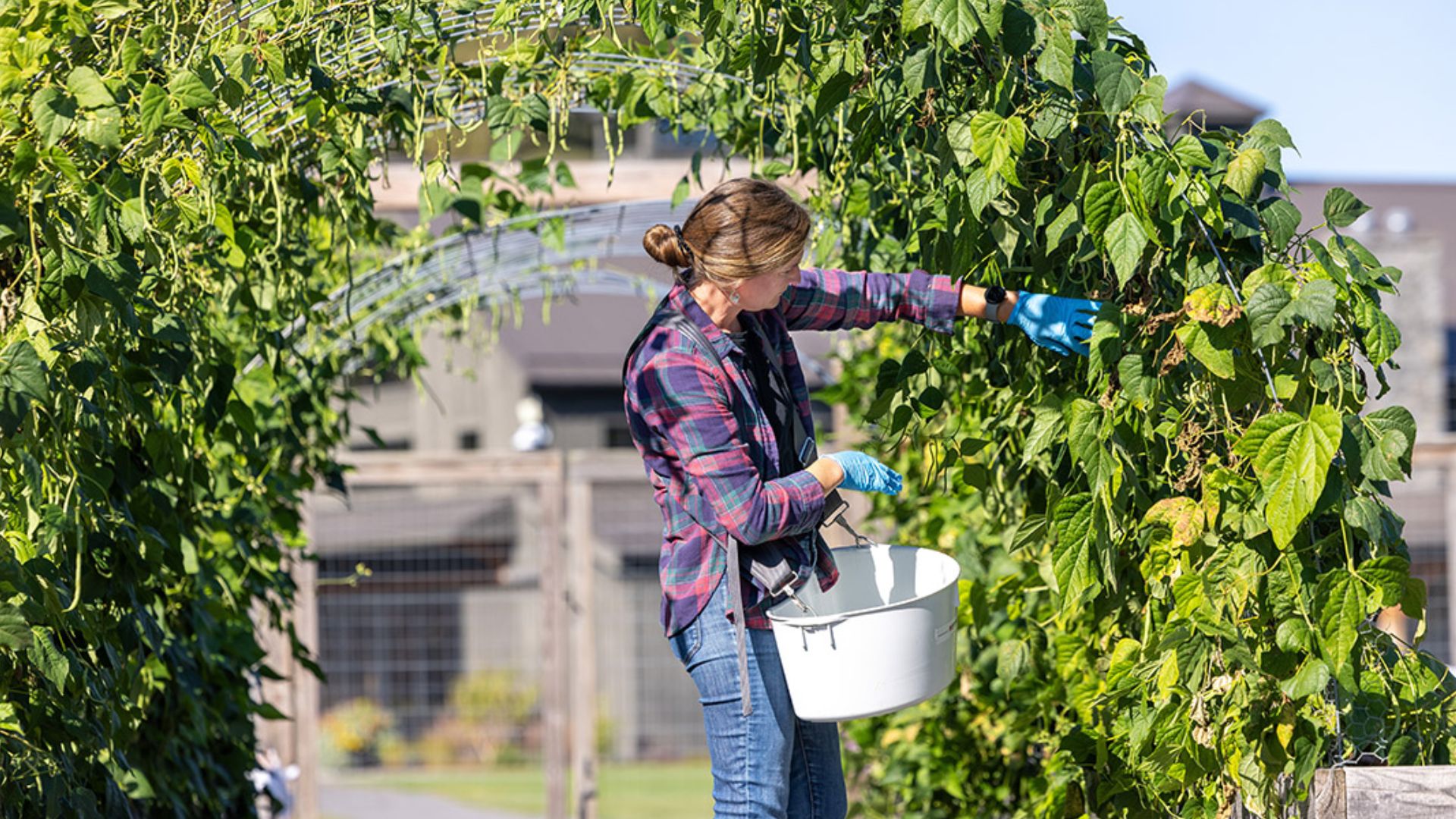Local News
Fresh vegetables from the Tait Preserve garden now make their way into meals served at RIT campus eateries each day

Rochester, New York – Students enjoying meals at RIT’s Gracie’s or Brick City Café might not realize that some of the vegetables on their plates were picked just hours earlier—right on university property. Thanks to the thriving garden at RIT’s Tait Preserve in Penfield, New York, campus diners are now benefiting from one of the freshest “farm-to-table” operations in the region.
Now in its fourth year of production, the Tait Preserve garden has become a quiet yet powerful example of sustainability in action. The 120-foot by 60-foot raised-bed garden produces roughly 3,000 pounds of vegetables and herbs annually. These harvests find their way into everyday dining options and special events served by RIT Catering, helping the university deliver healthier, more flavorful meals.
A Growing Vision for Campus Sustainability
The garden was originally designed with efficiency in mind—dense planting for high production in a compact space. The result is a flourishing micro-farm that produces a remarkable variety of crops, from kale and spinach to peppers, tomatoes, squash, eggplant, and an assortment of herbs. Every inch of the raised beds is used to maximize yield and minimize waste.
“Sometimes RIT Dining has had a hard time sourcing specialty ingredients such as habaneros and scotch bonnet peppers on a consistent basis,” said Meghan Gilbert, the preserve’s senior gardens and grounds specialist. These specialty peppers are vital for authentic Jamaican and Haitian dishes that have become increasingly popular on campus menus. “We’re able to fill a niche by growing items they cannot source elsewhere,” she said.
From Quarry to Garden
What makes the Tait Preserve garden even more impressive is its unlikely setting. The site was once a quarry, with soil so sandy it was unsuitable for traditional vegetable growing. To overcome this challenge, Gilbert and her team constructed raised beds—each about 30 inches high—filled with rich topsoil and compost. The design ensures that plants have the nutrients they need to thrive despite the terrain.
“We space plants closely for high-volume output,” Gilbert explained. “We try to provide RIT Dining with as much fresh produce as possible during our growing season.”
Harvesting often stretches well into December, thanks to cold-hardy crops like kale that can withstand lower temperatures. When the vegetables and herbs are ready, student employees pick them, pack them into bins, and prepare them for delivery to the university’s dining centers.
Freshness That Makes a Difference
For RIT Dining, the benefits of this homegrown produce go far beyond convenience. Gilbert says the proximity and speed of delivery directly impact the quality of the food students eat.
“Having this garden provides a huge advantage in the quality and freshness of the produce,” she said. “The shelf life, taste, and nutritional value is much better when you can serve it quickly after the harvest, in our case, sometimes as soon as the same day. You’re not getting that from any other supplier. It’s hyper local. It’s literally grown 15 minutes away from campus and delivered with an electric car.”
That local advantage has become a point of pride for RIT’s sustainability and dining programs, reinforcing the university’s commitment to environmentally conscious operations. The process eliminates long transportation routes, reduces packaging waste, and supports a true circular food system—where production and consumption happen within the same community.
Looking Toward the Future
But the garden is only part of the story at Tait Preserve. The grounds also include a young orchard planted in 2022, featuring around 600 apple trees of 11 different varieties. Gilbert expects the orchard to produce a viable crop next year, with most of the apples destined for fresh eating and some for baking or garnishing dishes on campus.
Each winter, Gilbert meets with RIT Dining staff to plan the next season’s crops and explore new ideas. Her team has already begun experimenting with microgreens and hydroponically grown watercress—an aquatic plant that Gilbert noted was identified by the Centers for Disease Control as the most nutrient-dense vegetable.
RIT’s broader goal of serving more plant-based meals has also opened the door to other innovative projects. Gilbert believes mushrooms could play a key role in helping the university meet that target. With their versatility and nutritional value, culinary mushrooms are being considered as one of the next major additions to the preserve’s production lineup.
“It’s a great little niche for us to try to figure out how we can play a part in this goal,” she said.
Cultivating Connection and Purpose
The Tait Preserve garden is more than just a food source—it’s also a living classroom. Students who work in the garden gain hands-on experience in sustainable agriculture, plant biology, and environmental stewardship. Their work helps connect the dots between theory and practice, showing how small-scale efforts can contribute to larger institutional change.
Every tomato, pepper, or bunch of kale harvested is a testament to collaboration—between dining services, grounds staff, and student workers who take pride in their contribution to the campus community.
As RIT continues to expand its sustainability initiatives, the Tait Preserve garden stands as a model of what can happen when innovation meets dedication. From once-barren quarry ground to a thriving garden supplying thousands of pounds of produce, it embodies the spirit of self-sufficiency and care for the planet.
And for the students who sit down to a fresh meal at Gracie’s or Brick City Café, the journey from soil to plate is as short as it gets—sometimes just fifteen minutes down the road.

-

 Local News12 months ago
Local News12 months agoNew ALDI store close to Rochester to begin construction in late 2025 or early 2026
-

 Local News11 months ago
Local News11 months agoRochester Lilac Festival announces exciting 127th edition headliners
-

 Local News9 months ago
Local News9 months agoCounty Executive Adam Bello and members of the county legislature celebrate exceptional young leaders and advocates at the 2025 Monroe County Youth Awards
-

 Local News9 months ago
Local News9 months agoThe 2025 Public Market Food Truck Rodeo series will begin this Wednesday with live music by the Royal Bromleys